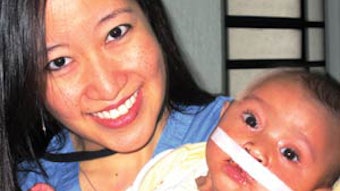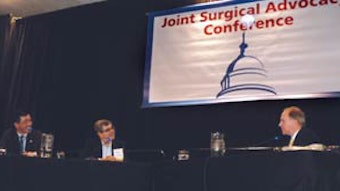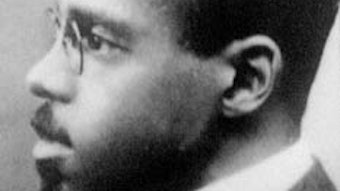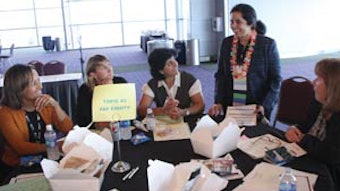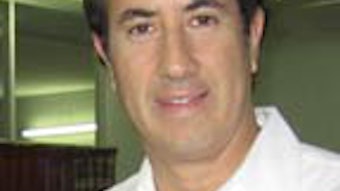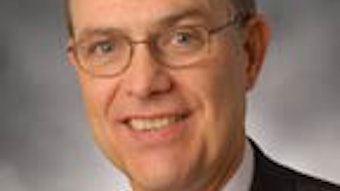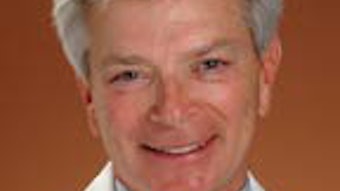Update from the 3P Workgroup
Michael Setzen, MD, coordinator for Practice Affairs and Richard W. Waguespack, MD, coordinator for Socioeconomic Affairs, co-chairs of 3P; with Jenna Kappel, director, Health Policy; Tricia Bardon, assistant director, Health Policy; and Udo Kaja, program manager, Payer Advocacy The Physician Payment Policy Workgroup (3P), chaired by Richard W. Waguespack, MD, and Michael Setzen, MD, is the senior advisory body to Academy leadership and staff on issues related to socioeconomic advocacy, regulatory activity, coding or reimbursement, and practice services or management. 3P and the Health Policy staff continue to ensure that members’ interests are appropriately represented. Below, we have highlighted some advocacy efforts. For the latest health policy updates, visit the What’s New page (http://www.entnet.org/Practice/CMS-News.cfm) on our website. Major Win On January 18, Drs. Setzen and Waguespack; J. Randall Jordan, MD, chair of the Plastic & Reconstructive Committee; Health Policy staff; representatives from sub-specialty societies Pete S. Batra, MD (ARS); John S. Rhee, MD; Steve Duffy (AAFPRS); Deborah S. Bash, MD, and Melanie Dolak (ASPS) had a conference call with Richard Justman, MD, the United Healthcare (UHC) national medical director, and other UHC officials. During this call, UHC agreed to revise its guideline on Rhinoplasty, Septoplasty and Repair of Vestibular Stenosis. Substantial progress was made with this revision. At the end of March, UHC incorporated almost all of our requests into the policy. Specifically, the insurer made the following changes based on our feedback. 1. All references to “anterior (primarily cartilaginous)” were removed from the requirements for coverage relating to septoplasty. 2. The description for posterior septal deviation was removed. 3. The definition for cartilaginous septal deviation was removed. 4. Indicated that isolated septal spurs generally do not cause a physiological impairment. 5. Reviews for nasal septal deviation will no longer reference anterior or posterior. The next revision for the policy is February 2012. UHC will only consider revising the policy before February 2012 if it determines that its medical directors are consistently misinterpreting sections of the policy and/or if it is causing undue burden to patients and physicians. The Academy and the other specialty groups involved in this effort are generally satisfied with this revised policy and thank UHC for allowing an open dialogue to discuss our issues. We anticipate that the number of non-certifications will decrease due to these revisions. However, if you are still experiencing non-certifications, please contact your local UHC medical director and copy healthpolicy@entnet.org on the request and outcome. Health Policy staff plan to continue monitoring these denials and will follow up with UHC if necessary. Also, we are drafting an appeal template letter to assist you with septoplasty denials and will post a final copy of the letter to the website and in a future issue of the Bulletin. We sincerely thank all the listed specialty and sub-specialty societies involved in this endeavor as well as the Association of Otolaryngology Administrators. For more information, please visit our website, http://www.entnet.org/Practice/CMS-News.cfm#ADV. Medical Policy Review Requests from Private Payers It has been a busy year so far with requests from private payers to review their medical policy drafts. We received requests to review the following policies: WellPoint • Functional Endoscopic Sinus Surgery and Balloon Sinuplasty for Treatment of Chronic Sinusitis. The Rhinology and Paranasal Sinus Committee reviewed both policies. • Cochlear implants. This policy was reviewed by the Implantable Hearing Devices Subcommittee (IHD). United Healthcare • Surgical Treatment of Obstructive Sleep Apnea. This policy was reviewed by the Sleep Disorders Committee. • Cochlear implants. This policy was reviewed by the IHD. • Transtympanic Micropressure. This policy was reviewed by the Equilibrium Committee. The process for reviewing medical policy drafts requires time, attention to detail, and collaboration among committee members. The members review these policy drafts to ensure they are based on evidence-based guidelines and current medical practice. They also provide scientific literature references to support the positions rendered in their reviews. The average time it takes to review these policies is four weeks. We cannot emphasize enough the importance of these medical policy review requests. National payers such as UHC and WellPoint cover more than 100 million people in the United States. In addition, WellPoint medical policies are the reference policies for the Blue Cross and Blue Shield Association. Generally, WellPoint hosts quarterly Medical Policy & Technology Assessment Committee (MPTAC) meetings where it reviews our submitted feedback as well as input from other sources such as academic medical centers, other specialty medical societies, etc. UHC holds monthly Medical Technology Assessment Committee meetings in which input from specialty societies and other groups are discussed. Typically, after these meetings, each insurer will send us a finalized medical policy. We thank the members of the Equilibrium Committee, Implantable Hearing Devices Subcommittee, Rhinology and Paranasal Sinus Committee, and the Sleep Disorders Committee for all of their hard work and time invested in reviewing and commenting on these medical policies. Contact Healthpolicy@entnet.org if you have questions.
The Physician Payment Policy Workgroup (3P), chaired by Richard W. Waguespack, MD, and Michael Setzen, MD, is the senior advisory body to Academy leadership and staff on issues related to socioeconomic advocacy, regulatory activity, coding or reimbursement, and practice services or management. 3P and the Health Policy staff continue to ensure that members’ interests are appropriately represented. Below, we have highlighted some advocacy efforts. For the latest health policy updates, visit the What’s New page (http://www.entnet.org/Practice/CMS-News.cfm) on our website.
Major Win
On January 18, Drs. Setzen and Waguespack; J. Randall Jordan, MD, chair of the Plastic & Reconstructive Committee; Health Policy staff; representatives from sub-specialty societies Pete S. Batra, MD (ARS); John S. Rhee, MD; Steve Duffy (AAFPRS); Deborah S. Bash, MD, and Melanie Dolak (ASPS) had a conference call with Richard Justman, MD, the United Healthcare (UHC) national medical director, and other UHC officials. During this call, UHC agreed to revise its guideline on Rhinoplasty, Septoplasty and Repair of Vestibular Stenosis. Substantial progress was made with this revision.
At the end of March, UHC incorporated almost all of our requests into the policy.
Specifically, the insurer made the following changes based on our feedback.
| 1. | All references to “anterior (primarily cartilaginous)” were removed from the requirements for coverage relating to septoplasty. |
| 2. | The description for posterior septal deviation was removed. |
| 3. | The definition for cartilaginous septal deviation was removed. |
| 4. | Indicated that isolated septal spurs generally do not cause a physiological impairment. |
| 5. | Reviews for nasal septal deviation will no longer reference anterior or posterior. |
The next revision for the policy is February 2012. UHC will only consider revising the policy before February 2012 if it determines that its medical directors are consistently misinterpreting sections of the policy and/or if it is causing undue burden to patients and physicians. The Academy and the other specialty groups involved in this effort are generally satisfied with this revised policy and thank UHC for allowing an open dialogue to discuss our issues.
We anticipate that the number of non-certifications will decrease due to these revisions. However, if you are still experiencing non-certifications, please contact your local UHC medical director and copy healthpolicy@entnet.org on the request and outcome. Health Policy staff plan to continue monitoring these denials and will follow up with UHC if necessary. Also, we are drafting an appeal template letter to assist you with septoplasty denials and will post a final copy of the letter to the website and in a future issue of the Bulletin.
We sincerely thank all the listed specialty and sub-specialty societies involved in this endeavor as well as the Association of Otolaryngology Administrators. For more information, please visit our website, http://www.entnet.org/Practice/CMS-News.cfm#ADV.
Medical Policy Review Requests from Private Payers
It has been a busy year so far with requests from private payers to review their medical policy drafts. We received requests to review the following policies:
WellPoint
| • | Functional Endoscopic Sinus Surgery and Balloon Sinuplasty for Treatment of Chronic Sinusitis. The Rhinology and Paranasal Sinus Committee reviewed both policies. |
| • | Cochlear implants. This policy was reviewed by the Implantable Hearing Devices Subcommittee (IHD). |
United Healthcare
| • | Surgical Treatment of Obstructive Sleep Apnea. This policy was reviewed by the Sleep Disorders Committee. |
| • | Cochlear implants. This policy was reviewed by the IHD. |
| • | Transtympanic Micropressure. This policy was reviewed by the Equilibrium Committee. |
The process for reviewing medical policy drafts requires time, attention to detail, and collaboration among committee members. The members review these policy drafts to ensure they are based on evidence-based guidelines and current medical practice. They also provide scientific literature references to support the positions rendered in their reviews. The average time it takes to review these policies is four weeks.
We cannot emphasize enough the importance of these medical policy review requests. National payers such as UHC and WellPoint cover more than 100 million people in the United States. In addition, WellPoint medical policies are the reference policies for the Blue Cross and Blue Shield Association.
Generally, WellPoint hosts quarterly Medical Policy & Technology Assessment Committee (MPTAC) meetings where it reviews our submitted feedback as well as input from other sources such as academic medical centers, other specialty medical societies, etc. UHC holds monthly Medical Technology Assessment Committee meetings in which input from specialty societies and other groups are discussed. Typically, after these meetings, each insurer will send us a finalized medical policy.
We thank the members of the Equilibrium Committee, Implantable Hearing Devices Subcommittee, Rhinology and Paranasal Sinus Committee, and the Sleep Disorders Committee for all of their hard work and time invested in reviewing and commenting on these medical policies.
Contact Healthpolicy@entnet.org if you have questions.
